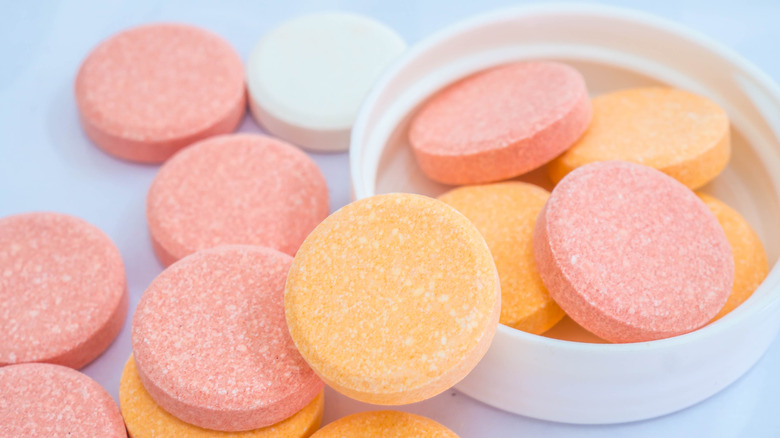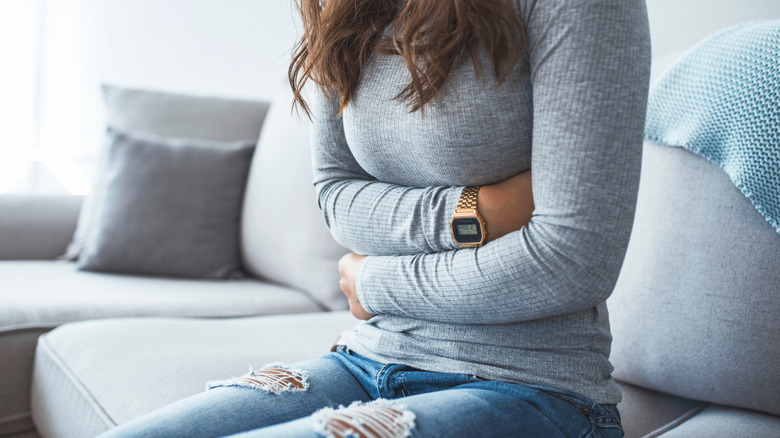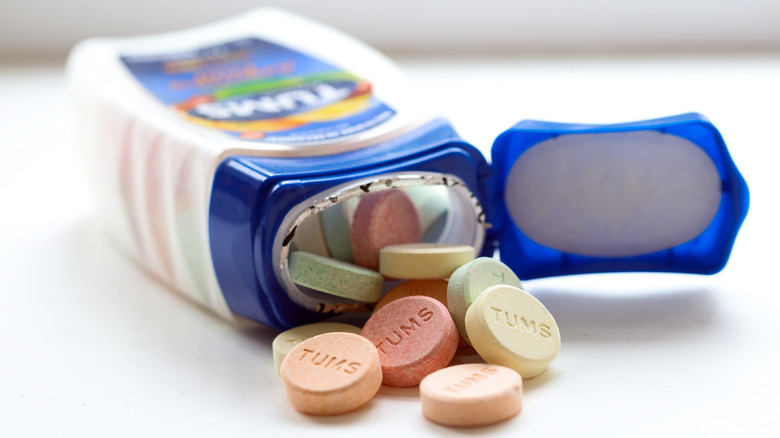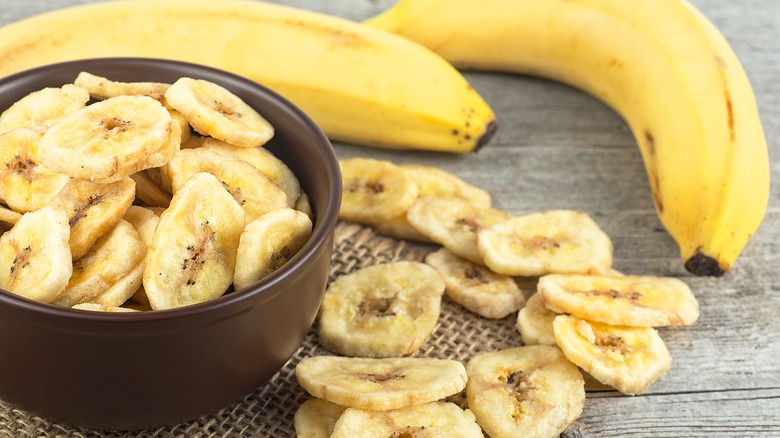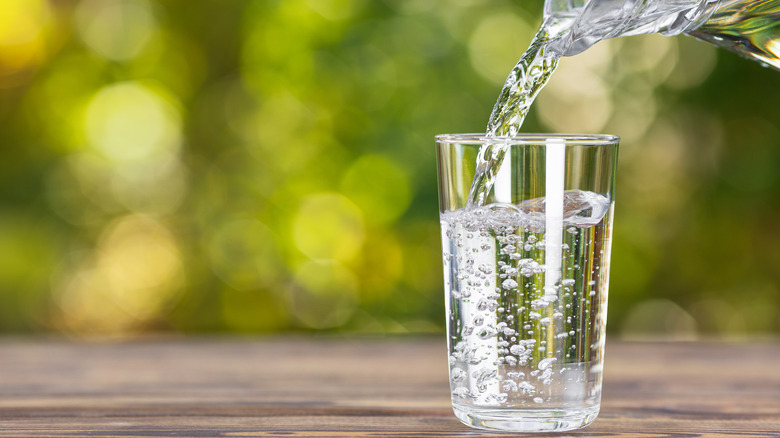This Is What Happens When You Mix Tums And Alcohol
Tums tablets are a popular way to treat stomach upset. And alcohol can cause inflammation of the stomach and intestines, leading to stomach trouble (via Medical News Today). But can you take the remedy if you're drinking alcohol, or is there a hidden reason to avoid it?
Taking Tums before, after, or while you drink is actually safe, according to Healthline, and shouldn't cause any problems. However, that doesn't mean it's a good idea. Calcium carbonate is the main ingredient in Tums and it doesn't interact negatively with alcohol. However, according to Tums' parent company, GlaxoSmithKline, alcohol relaxes the lower esophageal sphincter, causing acid reflux and heartburn. So, alcohol may be undoing any positive effect you would normally receive from Tums. The company notes that Tums is not intended to be a way to prevent heartburn caused by alcohol.
When drinking, some people also take an anti-inflammatory, such as ibuprofen or naproxen, to avoid the headache that comes with a hangover. These drugs can irritate the stomach lining, however, further leading to stomach upset.
What are Tums best used for?
Tums works because it has a high pH value, which neutralizes the low pH value of stomach acid. It is commonly used to treat heartburn or acid reflux, pain from a stomach ulcer, and stomach upset. According to the National Health Service, however, antacids like Tums only treat symptoms and not the root cause of pain. For that reason, they should only be used in the short-term and a doctor should be consulted if you find you need them regularly.
There are several types of antacids, including magnesium carbonate, sodium bicarbonate, and calcium carbonate. Because Tums is comprised of calcium carbonate, it is used by some people as a calcium supplement. The company's site states that Tums contains the highest amount of elemental calcium of all the different configurations calcium comes in. You should always speak with your doctor before adding a new supplement into your routine, however, including Tums for calcium.
Tums can relieve hangover symptoms
Tums may come in handy as you battle a hangover after a night of drinking. Since Tums are antacids and serve to neutralize stomach upset and stomach acid, the over-the-counter tablets could be helpful in decreasing the side effects of consuming alcohol, including heartburn, indigestion, and nausea (via MedicalNewsToday). You'll also want to prioritize drinking a lot of water since alcohol increases how much you urinate and leads to increased loss of fluids, which in turn puts you at risk of dehydration, an imbalance of electrolytes, and can enhance the discomfort of a hangover.
So if you take Tums to recover after a night of drinking, be certain to combine the antacids with lots of fluids that can help your body rehydrate. While Tums are known to help with heartburn, experts at Healthline state that if you've taken Tums to avoid heartburn and then you drink alcohol, the medication may not be as effective, since alcohol greatly exacerbates symptoms associated with indigestion.
Rather than just taking Tums after drinking, focus on replenishing electrolytes
You've probably heard about electrolytes, but what are they exactly? According to Cedars-Sinai, electrolytes are essential minerals, such as potassium, sodium, and calcium. Your body requires electrolytes for multiple reasons, which include keeping you hydrated, balancing pH levels, and regulating muscle contractions. Electrolytes are lost through bodily fluids like urine, sweat, diarrhea, and vomit. Since these bodily functions are common during hangovers, especially if a significant amount of alcohol has been consumed, it's critical to replenish electrolytes.
Healthline reports that all antacids contain electrolytes. Not only can Tums help to relieve hangover symptoms like upset stomach and heartburn, but the antacid tablets can also aid in increasing these important minerals. However, it's extremely important to adhere to the directions on the Tums container and not take more antacids than recommended.
If you want to replenish electrolytes after having alcohol, there are many foods that contain electrolytes (via Insider). Did you know that watermelon, avocado, and unsweetened coconut water all contain electrolytes? The potassium in bananas is another very good source of electrolytes. Other sources of electrolytes include magnesium, chloride, and phosphorus, so foods with these minerals can help you overcome a hangover. If you're looking to combine protein with electrolytes in the same dish, try white meat, poultry, and dairy. You can also use electrolyte-infused powders mixed into water and sports drinks to simultaneously replenish fluids and electrolytes your body loses when you consume alcohol.
Tips for minimizing hangovers
When recovering from a hangover, Tums alongside plenty of water and electrolytes can help relieve some of the discomfort (per MedicalNewsToday). If you went out drinking the night before, you should prioritize eating breakfast the next morning to fill your body with the nutrients it needs to properly recover. Try to eat foods with healthy fats, protein, carbohydrates, and lots of vitamins. You may crave a greasy dish or something with a lot of carbs, but there is no evidence indicating that greasy foods are any more or less helpful than other foods for hangover recovery.
Water and sports drinks are advised during the hangover period, while caffeinated beverages like coffee and tea are debated, reports Healthline. While alcohol stays in your body for approximately 25 hours, the effects of caffeine last about six hours. Since caffeine is a stimulant, it can make you feel more attune and energetic. However, alcohol has the opposite effect since it acts as a depressant and can make you feel drowsy.
Mixing stimulants with depressants can make the depressant's effects less noticeable, and can thus lead to increased consumption of alcohol if mixing caffeine and alcohol. One result of mixing the two is a more intense hangover. And if you're craving a cup of coffee or other caffeinated beverage when you're in a hungover state, be mindful that caffeine can contribute to dehydration and enhance the symptoms of a hangover.

